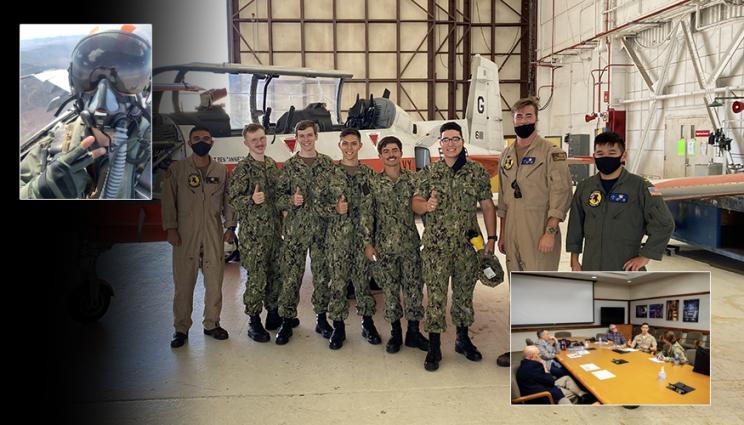
Justin Witkowski, fourth from left in main photo, came to the Laboratory through the Academic Cooperation Program (ACP) to intern and gain valuable experience between graduating from Texas A&M University with a degree in Aerospace Engineering, to beginning his military service with the Navy.
Justin Witkowski came to Lawrence Livermore National Laboratory (LLNL) for a unique internship opportunity, one that would allow him to gain some practical experience during the gap between completing his undergraduate degree and starting his military career in the Navy.
Witkowski started his LLNL internship in February under the Academic Cooperation Program (ACP). ACP offers newly graduated ensigns the opportunity to intern at the Lab for as long as they are able.
"I had a large gap of time between graduating back in December and starting my first Navy training in May, so I saw the chance to apply my aerospace degree here in the meantime," Witkowski said.
He grew up in Dallas, Texas and after graduating high school in 2017, Witkowski went on to Texas A&M University where he received his bachelor's in aerospace engineering in December 2021. He participated in Naval ROTC throughout college and was officially commissioned as an officer the same day he received his degree.
Witkowski said that his dad enlisted in the Navy during the First Gulf War and that inspired him to join. "My mom immigrated from Vietnam as a refugee and has always worked hard to provide for me and my younger brother," he said. "They both pushed me to strive for great things and to work hard at whatever it is I do."
Through this internship, Witkowski was able to learn what it takes to conceptualize, develop and make military systems operational. He was able to experience first-hand the amount of research and decision-making that goes into every material, structure and component.
"I've been working as an academic collaborator in Weapons Complex Integration under Joe Wasem and Mike Hohensee, to explore and model asteroid defense and reentry dynamics across a wide range of parameters, integrating both NASA and LLNL software to explore these situations," he said. "I've also been taking advantage of opportunities to go on tours of some Lab facilities, such as the National Ignition Facility and the High Explosives Application Facility."
"Justin was great to work with," said Hohensee, group leader for Design Execution and Advanced Tools. "He took an orbital mission analysis tool that we were only starting to learn about, quickly got a handle on it and then used it to evaluate many variations on an asteroid defense scenario. At the same time, he showed the rest of us how to efficiently operate the modeling software. Justin's work provides a good foundation for the project to build on. We're very pleased that he came to intern with us this year."
What's different about this internship program is that when ensigns graduate, they are then considered active duty, making a military salary and receiving a housing stipend. "Because of this, we can't cover any costs," said Barry Goldman, manager of the Military Student Program. "I've been able to attract, from time to time, an ensign from Berkeley or UCLA. However, its rare to find someone willing from out of state. Justin saw the value to intern with us at his own costs until he starts his service."
Goldman added that while the program allows ensigns to gain valuable experience, it also is a benefit to the Lab. "For the Lab's researchers, it is an opportunity for support on projects that we might not normally have time for. Of course, it must be something that can be done in as little as a few months as the ensign is onboarded as an ACP," he said. "Another benefit is the ensign comes with a clearance and a military perspective and we can engage them in their major. We can challenge ensigns and educate them about LLNL, DOE, NNSA and many of our programs that support the war fighter."
Witkowski left the Lab in April to start his Navy flight training in Pensacola, Florida.
"There, I will learn everything about aviation and how to fly a Cessna, a T-6 trainer and hopefully get selected for jets. My military experience thus far has usually been limited to controlled environments due to the way ROTC structures itself, with priority being placed on foundational skills like leadership development instead of specific Navy job skills," he said. "The exception was last summer, where I spent a month alongside an F/A-18 squadron down in Lemoore, California to see the squadron operate, their lifestyle and to gain exposure overall. I already had an interest in aviation beforehand, but that month solidified my interest to fly."
Witkowski said that there are skills he learned while in the military that carry over nicely to work at the Laboratory. "The military has taught me to be self-disciplined as you'd expect, but also how to lead people to accomplish goals, how to carry on efficiently under stress, time management skills and how to make decisions with their aftermath in mind," he said. "To that end, the Lab is a great way for many veterans to transition back into the civilian world. The developments here make a very tangible difference for the troops out there, and the Lab offers veterans a great way to stay involved in military affairs without necessarily becoming a defense contractor or an interest group speaker."






